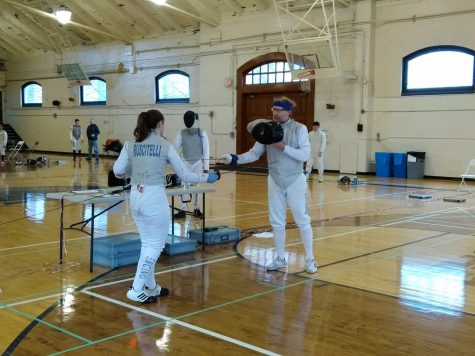A fleche toward success
Ruscitelli finds growth in fencing

Kristen Ruscitelli has been fencing for a while now, and every time she steps onto the strip, she feels the confidence rush through her body as she gets ready to begin. Once she hears the “En garde!” from the referee, it’s game over for the opponent, who has no idea that some quick thinking, lunges, and beats will ensure her victory.
Great stories sometimes start with an individual rising to the occasion, but that’s not always the case. Sometimes all it takes to begin something great is a little nudge. Ruscitelli’s mother saw an advertisement for a fencing program and signed her up for it, thinking Kristen would enjoy it the way her mother did in college when she did fencing noncompetitively. Fast forward ten years later, and Ruscitelli is still fencing.
“Since fencing is a year-round sport, different times of the year are used to focus on different things,” Ruscitelli (12) said, “For example, after Summer Nationals, coaches will usually focus on conditioning such as footwork and bladework to boost speed and endurance. Before large tournaments, the focus will be more on perfecting certain skills and strategy.”
Fencing, just like any other sport, is more than as it seems. In fencing, you practice more than swordplay. While it is the main focus, you would need many other skills as well, such as hand-eye coordination, fancy footwork, and endurance to ensure victory.
Another thing athletes face during their sporting events is jitters. They can get very nervous and uneasy, but they can all happen at different times. Some get them the day before, while some get them only right before the event begins. Ruscitelli claims that she’s the most nervous before she starts fencing, especially at national events.
“You’re in a room with hundreds of people who are literally screaming every time they score a point and the entire scene is really chaotic,” Ruscitelli said, “It’s very easy for people to get inside your head while you’re getting your equipment checked and warming up.”
However, athletes also have their own personal way of dealing with those jitters.
“Once you get on the strip and put your mask on it’s a lot easier to tune everything out and focus on the sequence of actions you need to do to score the next point,” Ruscitelli said.
Fencing may not be like the sports that schools prioritize, like football or basketball, but all athletes having reasons for playing the sports they do. Ruscitelli fences because she enjoys that the ability to succeed in fencing hinges on more than just the physical abilities of an individual. She says that it’s just as important to have the ability to confuse and outsmart your opponent in a fraction of a second.
Of course, there’s also the friends you can make from playing a sport, which anyone can agree is a great perk that comes with joining a team.
“I’m actually friends with quite a few people in Cleveland. I’ve also met a few people across the United States and Europe as well. It’s a little surprising that we’re such good friends considering I only see most of them in person two or three times a year.” Ruscitelli said.
“It takes a long time to develop skills and become ‘good’ at fencing. However, once you devote time to the sport,” Ruscitelli said, “you’ll find that it has benefits that no other sport could give you, and because of this, I would absolutely recommend fencing to anyone who is interested.”









